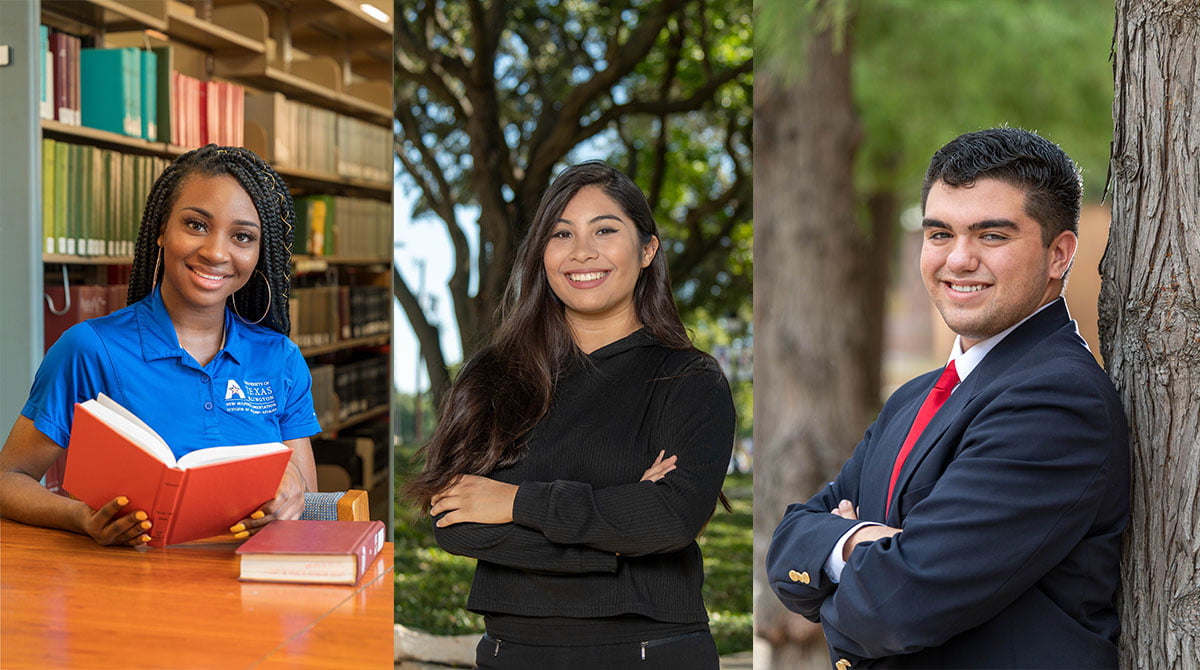UTA students “make their marks on the world”

Student success is measured in how Idara Ekong, Juana Escobedo Bermudez and Matthew McCurdy are not only graduating on time, but also contributing to The University of Texas at Arlington.
All are first-generation college students who have the tools UTA gave them to succeed. Each accessed programs and services offered through the Division of Student Success that eased their transition to UTA, offered assistance in obtaining financial aid or helped them find a sense of belonging both in the classroom and on campus.
Their experiences reflect a broader trend at UTA, where traditional measures of student success—including completion rates, graduation progression and retention—are all on the rise.
In an arena in which a few percentage points can represent miles of progress, UTA is experiencing a 3.4% increase in transfer four-year graduation rates, along with improved figures in first time in college six-year graduation rates and in one- and two-year retention rates.
It’s the latest sign of success for one of the largest and most diverse universities in Texas. Earlier this year, Washington Monthly magazine ranked UTA as the top national university in North Texas, based on a methodology that accounts for contributions to the public good in three broad categories of social mobility, research and public service. The rankings also placed UTA first in Texas and 23rd nationally for the performance of first-generation students.
Ashley Purgason, associate vice provost in the Division of Student Success, said she believes this success has come on three fronts: culture, infrastructure and a sense of community.
“I think the energy on campus has really grown. You can feel it,” said Purgason, who earned two of her degrees at UTA. “The support system is in place now for those first-generation students. We’re headed in the right direction.”
UTA’s progress can best be demonstrated through the experiences of some of its students.
Idararosa Ekong
A native of Nigeria, Ekong attends UTA thanks to the Terry Foundation Scholarship Program, which provides scholarships for Texas residents to support their goal of earning a college degree. Terry Scholars are selected based on their demonstrated leadership, academic achievement and financial need.
“I came to this country when I was 11, and it was hard for me to understand the accents. I didn’t know anyone,” said Ekong, who attended Arlington Collegiate High School. “I chose to attend UTA as a Terry Scholar to be surrounded by peers like me who aim to make their marks on the college community and the world.”
She chose to become a Peer Academic Leader because she saw the high percentage of foreign-born students who needed additional help.
“I know how they feel,” Ekong said. “My commitment to mentorship comes from the heart. But it also led me to receive a job this fall as a Peer Academic Leader, teaching two first-year success classes—nursing and biology—both of which give me a platform to teach academic excellence.”
Juana Escobedo Bermudez
Juana Escobedo Bermudez, another first-generation student and a public health senior, used the Division of Student Success before she even became a UTA student.
“I’m the oldest, so my parents had not gone through any of the college experience,” Bermudez said. “Those services gave me and my parents the confidence we needed to succeed. I enjoyed studying, but the services solidified my understanding of using resources such as financial aid, how to apply for more scholarships and how to improve academically as well as socially as a commuter student.”
After arriving at UTA, Bermudez took full advantage of the computer lab the division offers, as well as one-on-one tutoring. She also landed a work-study job through the division.
“The student success services give more individualized attention to your specific challenge at the time,” she said.
Matthew McCurdy
McCurdy initially wanted to be a police officer, but became interested in a legal career instead.
“I signed up for a mock trial in high school and caught the bug,” said McCurdy, who will continue with law school after completing his degree in criminology in May 2020.
TRIO—which includes the programs of Upward Bound, Talent Search and Student Support Services—has been McCurdy’s go-to resource for help.
“TRIO offered more than help with my academics,” McCurdy said. “It was a safe place to go. It helped me socially because it became a place where I could go to talk to a specialist or a fellow student who was experiencing the same things I was experiencing.”
Purgason says an increased emphasis on data analytics and UTA’s friendly, welcoming atmosphere are making measurable impacts on UTA’s students, about 10,000 of whom now live on or adjacent to campus.
“Student success is everyone’s job,” she said. “There’s a real understanding of what’s needed to breed, nurture and sustain success.”